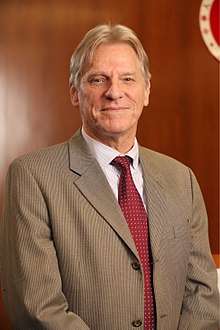Michael C. Davis
Michael C. Davis (Chinese name Chinese: 戴大為; pinyin: Dài Dàwéi} is the Professor of Law and International Affairs at India's O.P. Jindal Global University, a Senior Research Scholar at the Weatherhead East Asia Institute at Columbia University, and a Global Fellow at the Woodrow Wilson International Center for Scholars in Washington, DC. Until stepping down in 2016, he was professor in the Law Faculty at the University of Hong Kong, where he remains a non-resident senior fellow in the Centre for Comparative and Public Law.[1] His books include Constitutional Confrontation in Hong Kong (1990), Human Rights and Chinese Values (1995), and International Intervention in the Post-Cold War World (2004). His articles have appeared in leading scholarly journals in law and political science. Before moving to Hong Kong, as an Hawaii attorney, he worked for the Native Hawaiian Legal Corporation on indigenous rights and land use issues.[2] As a public intellectual and human rights advocate in Hong Kong, he was a founder of both the Article 23 Concern Group and the Article 45 Concern Group which led massive protests for human rights in 2003 and 2004.[3] His human rights work has also included a nearly two decade engagement on the Tibet issue and on human rights and development issues across Asia.
Michael C. Davis | |
|---|---|
 Professor Michael C. Davis | |
| Born | USA |
| Occupation | Professor |
| Known for | Human rights advocacy and expertise in Asian development |
Academic career
Davis has held numerous academic positions in several leading academic institutions, including the J. Landis Martin Visiting Professorship in Human Rights at Northwestern University, the Robert and Marion Short Visiting Professorship at Notre Dame University and the Frederick K. Cox Professorship at Case Western Reserve University, as well as the Schell Senior Fellowship in Human Rights at Yale Law School. He is a Senior Fellow at the Liu Institute for Asia Studies at the University of Notre Dame and was a 2016-2017 Reagan-Fascell Democracy Fellow, at the National Endowment for Democracy, where his research related to "resistance movements and constitutionalism in emerging democracies in Asia."[4] Professor Davis held the Wilson Center Residential Fellowship for 2018-2019 at the Woodrow Wilson International Center in Washington, DC where his project title is "Reversing the Liberal Retreat and Establishing Constitutionalism in Emerging Democracies in Asia." His contributions to higher education were recognised in the "Award for Distinguished Service and Outstanding Contribution to the Field of Higher Education in India," awarded by the O.P. Jindal Global University in 2015 and in a "Certificate of Commendation" from the International Committee for the Red Cross, in regard to his contribution to the founding in 2011 of the Asian Regional Humanitarian Law Moot Competition.
Publications
Books
International Intervention in the Post-Cold- War World: Moral Responsibility and Power Politics, (New York: M.E. Sharpe, 2004) (lead editor)
Human Rights and Chinese Values: Legal, Philosophical and Political Perspectives (Oxford University Press, 1995) (editor)
The Aftermath of the 1989 Crisis in Mainland China (Boulder: Westview Press, 1992) (co-editor)
Constitutional Confrontation in Hong Kong (London: Macmillan Press, 1990; New York: St. Martins Press, 1990) (author)
Recent journal articles
"Strengthening Constitutionalism in Asia," Journal of Democracy, Vol. 28 (October 2017) pp. 147–161.
"The Basic Law, Universal Suffrage and the Rule of Law in Hong Kong," Hastings International and Comparative Law Review, Vol. 38/2, Spring, 2016, pp. 275–298.
"Can International Law Help Resolve the Conflicts Over Uninhabited Islands in the East China Sea?", Denver Journal of International Law, Vol. 43/2 (2015) pp. 119–163.
"Tibet and China's National Minority Policies," Orbis, Vol. 56/3, (2012), pp. 429–446. https://dx.doi.org/10.1016/j.orbis.2012.05.009
Human rights advocacy
In response to the Hong Kong Government's proposed draft legislation on national security under the Hong Kong Basic Law Article 23, which proposal raised worries on infringement of freedom of assembly and expression, Davis and eight other well known lawyers founded the Article 23 Concern Group (later renamed to Article 45 Concern Group) in 2003. The Article 23 Concern Group led the massive protest against the proposed legislation. The Hong Kong government later withdrew the legislative proposal after more than 500,000 people protested against the proposal, one of the largest protest since the 1997 handover of Hong Kong to China.
Davis has advocated for political reform and universal suffrage in Hong Kong and around Asia for more than two decades. His prolific commentary have been seen in newspapers such as The New York Times, the South China Morning Post, the Washington Post, the Nikkei Business Magazine, Foreign Affairs, and the Apple Daily, as well as quasi-academic media such as Yale Global. He has appeared for interviews on crucial human rights topics in such broadcast media as CNN, the BBC, National Public Radio and NBC News. He expressed his sympathy for the 2014 Hong Kong Umbrella Movement and argued non-violent civil disobedience did not undermine rule of law in Hong Kong,[5] that the government's loose interpretation of the Basic Law posed a greater threat. As a result of his numerous commentaries that year, Amnesty International and the Hong Kong Foreign Correspondence Club awarded him the 2014 Human Rights Press Award for commentary.[6]
References
- www.beansbox.com, Copyright by HKU Faculty of Law. Site by BeansBox -. "Faculty of Law, The University of Hong Kong » Research » Research Profile". www.law.hku.hk. Retrieved 6 November 2017.
- "【專訪】港大憲法學者戴大為退休 寄語港人普選未分勝負". Apple Daily 蘋果日報. Retrieved 6 November 2017.
- "Rights campaigner bids Hong Kong a reluctant farewell". South China Morning Post. Retrieved 6 November 2017.
- "Michael C. Davis – NATIONAL ENDOWMENT FOR DEMOCRACY". www.ned.org. Retrieved 6 November 2017.
- Davis, Michael C. (7 November 2014). "Occupy protests breaking law, but not undermining Hong Kong's rule of law". South China Morning Post. Retrieved 9 January 2020.
- "Winners 2014". 12 May 2015.